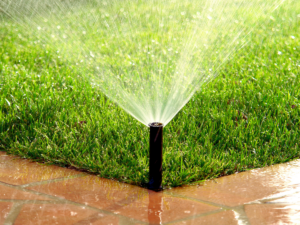 A good irrigation system does more than water your lawn. It saves time, reduces wasted water, and keeps your landscape healthy.
A good irrigation system does more than water your lawn. It saves time, reduces wasted water, and keeps your landscape healthy.
Manual watering is inconsistent. Some areas get too much water; others don’t get enough. Irrigation systems fix that by delivering the right amount of water where it’s needed.
This article breaks down how irrigation systems work, their components, and why they’re worth the investment.
Key Takeaways
- Irrigation systems automate lawn watering, improving efficiency.
- They reduce water waste by optimizing delivery.
- Key components include pipes, valves, sprinkler heads, and timers.
- Proper maintenance prevents malfunctions and saves money.
- Professional installation ensures optimal performance.
Irrigation System 101
An irrigation system is a network of underground pipes connected to a water source. It distributes water through sprinkler heads on a set schedule.
The system replaces manual watering, ensuring even coverage and reducing water waste. Automated systems save time and money by preventing overwatering and under-watering.
Key Components of an Irrigation System
An irrigation system functions through a combination of interconnected parts, each playing a role in efficient water distribution.
- Water Source – Typically from a well, city supply, or rain barrel.
- Water Pipes – PVC or polyethylene pipes transport water underground.
- Water Pump – Moves water from the source to the pipes.
- Valves – Control water flow and direct it to different zones.
- Sprinkler Heads – Pop up and distribute water. Available in fixed, rotating, or drip systems.
- Backflow Preventer – Keeps contaminated water from re-entering the main supply.
- Control Panel/Timer – Automates watering times to ensure consistency.
How Irrigation Systems Work
Irrigation systems operate by pulling water from a source and distributing it through underground pipes to designated areas. When the system activates, valves open to control the flow of water, directing it toward sprinkler heads. These heads then distribute water across the lawn based on their set patterns—whether rotating, oscillating, or fixed.
The system runs on a set schedule. It is managed by a control panel or timer. This ensures regular watering without any manual work. Once the cycle completes, the valves close, and the system shuts off, preventing unnecessary water use.
The Benefits of Irrigation Systems
 Healthier Lawns & Gardens
Healthier Lawns & Gardens
Plants need consistent hydration. Irrigation systems prevent under-watering and over-watering, promoting even growth and stronger root systems.
Wastes Less Water
As much as 50% of outdoor water use is lost due to wind, evaporation, and runoff from inefficient irrigation. A poorly maintained system can waste up to 25,000 gallons of water annually. Automated scheduling optimizes watering efficiency, reducing waste.
Convenience & Ease of Use
Irrigation systems provide set-and-forget functionality. Once installed and programmed, they handle watering automatically, saving homeowners time and effort.
Maintaining Your Irrigation System
Regular maintenance is key to keeping an irrigation system working properly. Dirt or grass can clog sprinkler heads, leading to uneven watering. Stuck or damaged heads, often caused by lawnmowers or foot traffic, need to be checked and replaced.
As temperatures drop, winterizing the system prevents frozen pipes and potential backflow damage. Draining water from the system or hiring a professional for blowout services can prevent costly repairs.
Trust the Experts at Lawn Sense With Your Irrigation Systems
 Lawn Sense takes the guesswork out of irrigation. Whether you need a new system, repairs, or seasonal maintenance, their team ensures everything runs smoothly. Serving Dallas, TX, and surrounding areas, they provide expert service with a commitment to efficiency and reliability.
Lawn Sense takes the guesswork out of irrigation. Whether you need a new system, repairs, or seasonal maintenance, their team ensures everything runs smoothly. Serving Dallas, TX, and surrounding areas, they provide expert service with a commitment to efficiency and reliability.
Lawn Sense means no nonsense. Get professional irrigation support today.
FAQs
Irrigation systems raise common questions, especially for homeowners considering installation. Below are answers to some of the most frequently asked questions.
How long should I run my irrigation system?
It depends on the system and climate. Most lawns need about one inch of water per week, which typically means running the system for 30–45 minutes per zone, two to three times per week.
What’s the difference between sprinkler and drip irrigation?
Sprinkler systems spray water over a wide area, while drip irrigation delivers water directly to the base of plants. Drip systems work best for gardens and shrubs, while sprinklers are ideal for lawns.
How often should I check my irrigation system?
Inspect it at least once a season. Look for clogged sprinkler heads, leaks, or zones that aren’t receiving enough water.
Do irrigation systems increase water bills?
A properly maintained system can actually lower water bills by reducing waste. Efficient scheduling ensures plants get just the right amount of water.
Final Thoughts
An irrigation system makes lawn care easier, improves water efficiency, and helps maintain healthy grass and plants. Regular inspections keep the system running smoothly, preventing wasted water and costly repairs. Whether installing a new system or maintaining an existing one, professional service ensures optimal performance.
For expert help, contact Lawn Sense—because Lawn Sense means no nonsense.